- Home
- Andrew Seiple
Dire : Wars (The Dire Saga Book 4) Page 2
Dire : Wars (The Dire Saga Book 4) Read online
Page 2
“Just asking questions.” I looked her up and down. She was wearing jean shorts and a light blouse, worn but good shoes on her feet. So about two more pieces of clothing than the rest of the tribe, who made do with simple pants or sari-like wraps most of the time. Paan was sharp, both in personality and mind. Paan was impatient. Paan had gone to school. Paan was young and full of fire, and did not like Americans at all. I supposed that might intimidate the average person. But I gave no fucks and didn’t care to pretend otherwise. Which made her focus on me, as a target of her aggression when she was home at the village.
Wasn’t often. She shuttled back and forth to the city, riding her bike through the jungle and up the road every other day or so. I half-suspected she was a local hero... she certainly had the physique for it, and she kept silent about what she did in town. There were signs of a secret, to those who have experience with that sort of thing. But I had my own secrets and no desire to pry. If she was a hero, good for her. So I met her glare with a cheeky smile, and put a cheerful note in my voice. “So, had a burger yet?”
“No. I’m surprised they made it through customs.”
“More surprised by the beer, really.” I gestured at the case next to Benny.
“It didn’t all get through, not completely,” Benny called over. Sharp ears, that one. “Case was open when it got here, about half the bottles are missing. Only reason I haven’t cracked them yet.”
“Half? Hey, new record. Wonder what else they’ve taken?” I asked.
“They take less from you than they do from us. Because you’re white.” Paan said.
I raised an eyebrow, and indicated Benny, darkest guy here.
“Because you’re American,” she amended, frowning harder.
“Yes,” I said, heading toward the grill. “That’s so.”
“This is fine to you, and you wonder why people outside your country hate you so much.”
“Wrong on both counts.” I said, smiling graciously at Mary as she handed me a plate laden with a greasy beef patty between two thin buns. “It isn’t fine and she doesn’t have to wonder. She knows why.”
Mary put on a brittle smile, as she offered another plate to Paan. “Come on now hon, this is a party. It’s a nice day, let’s keep it that way, okay?”
Paan ignored the plate, kept glaring at me. “Why are you here, anyway? What do you hope to do here? To change, here?”
“Well, the village has one more house than it did yesterday.” I gestured back to the jungle. “That’s a start.”
“You are not one of us.”
I didn’t give a shit about her problems or her attitude, but Mary was biting her lip so hard I was afraid she’d start spitting bloody chunks onto the sand. So I pulled myself up to my full height, and looked down upon Paan, as I replied in her people’s own language.
“We are all children of Maaya.”
And every Chamis on that beach within earshot stopped what they were doing, and touched their hands to the center of their chest, looking down with closed eyes.
All save for Paan. She started to, but then recoiled as if I’d struck her. Her mouth opened and shut, and she looked to the side. “Maaya’s a myth,” she whispered. “And not for you anyway.”
I smiled wider, touched my hands together between my breasts, and looked down. After a second I heard a disgusted snort, and the sound of Paan rapidly retreating.
“Well bless her heart,” Mary muttered behind me.
Sounded harmless. But long exposure to Mary had taught me that was one of the most venomous curses that she had in her repertoire.
“She’s all sound and fury,” I reassured the younger woman. “Her bitterness is understandable, too. The current regime broke most of its promises to her people, and that doesn’t look likely to change any time soon.”
“Well that’s sad, but that isn’t our fault,” Mary frowned.
“Can’t say I’m too sure about that,” Benny said. “Politics back home and all.”
“Politics, who cares?” Mary said. “I’m talking just simple human decency. We’re here to help.”
The mission of the Peace Corps, somewhat paraphrased, is to introduce volunteers to international cultures, introduce those cultures to American ways and traditions, and to do a little good along the way.
And oh, hadn’t it been easy to hack myself into their system when I needed an unassailable refuge to plot and plan. Still felt a little guilty about exploiting a charitable system. But I was doing some good here, and my plans were unlikely to cause any major problems for the Chamis. I’d be done and gone after I’d wrapped up one or two things, leaving goodwill in my wake. And a few houses, if they survived hurricane season.
The burgers were greasy and good and gone, fast. The Chamis were happy to share our food, and if they didn’t like the meat patties they didn’t gripe about them. The kids loved the cola, that was for sure, and I sat down on the beach and watched the waves roll in as a couple of dozen kids ran back and forth, yelling and playing and being children.
Someone sat down beside me, and I looked over to see Gulam resting on his haunches. I nodded to him and looked back out at the ocean, comfortable with the company.
“She has a lot of anger.”
He was talking about Paan, of course. Odds were good she was his daughter. The tribe didn’t do marriages on the whole, and was quite polyamorous as a society. So children knew their mothers, but their fathers were usually harder to figure out, barring physical similarities or the rare bout of monogamy.
I’d enjoyed a few benefits of that, now and again. Discretely of course, and always with appropriate birth control measures. Nothing serious, just being social and enjoying my body and others’. Enjoyable, but I was going to be leaving soon, and I didn’t want to form any long-term attachments.
“Paan’s anger is understandable,” I replied in his language. “Not offended at all.”
“Things were worse before the Peace Corps started sending you people here. More harassment from the government, from the police. Now they just do it where you cannot see.”
“Or it’s petty things like the beer. And the other supplies that get stolen,” I said, picking up a stone and tossing it into the waves. “Annoying but within tolerances.”
He followed the stone’s arc, looked past it. “The fishers are almost back. Do you wish to help bring in the catch?”
What I wanted was to be lazy and sit on the beach some more. I’d spent most of the day building a house, and had a belly full of good food. But I wanted to keep Gulam’s goodwill more, so I nodded, and followed him over to meet the incoming boats. Mitch followed as well, though the other Peace Corps folks begged off. And we dug in with the rest of the villagers, moving fish onshore.
It was a hell of a catch. The currents that slithered around Cuba’s western coast and curled their way south brought the Chamis a bounty that would sustain a settlement four times their size. Fish of all shapes and sizes filled their nets daily, and every afternoon they came back in with a good haul.
They’d taste perhaps ten percent of it.
The rest went into cold storage, deep caves near the shore that would keep and preserve the fish for a precious day or two. Then the cargo ship would chug its way across the bay, and the inspectors would run their eyes over the catch, select the best of it, and load it up for shipping to the resorts, restaurants, and markets of Ciudad Mariposa. This was the tithe the Chamis paid for living on their own ancestral lands. Oh, they got a pittance in return for it, but it was barely enough to afford the seed grain, medicines, and sundries that a village this size required.
It wasn’t a good situation, but I didn’t see a good way to fix it. Some subtle investigation and monitoring of the Mariposa Gridnet had revealed onion-like layers of corruption throughout Presidente Corazon’s government. This was hardly the worst of his excesses, though he’d quieted down in his old age. A subtle fix was beyond my resources at this point, and a louder one wouldn’t do much good in the l
ong-term.
Moving the fish into the caves was hard, sweaty work, and moving from the chill of the caves to the warmth of the open air made it harder. Finally, as the sun began to head down in the sky, we gathered around the central firepit.
And there we heard the song of Maaya.
This, this had taken some getting used to, back during the first few days of our arrival. This strange, lilting song rising up to the skies, wending through the palm trees like a gentle breeze. Every member of the tribe had their part of it, their line or a few notes that were theirs to sing, and theirs alone. The tale of centuries, millennia perhaps... of how Maaya the warrior had come to Mariposa. How she’d slain the monsters that haunted the night, calling down the sun into her hands to burn away their darkness. How she’d unified the warring people of the island. And how she’d left, promising to return in its darkest hour.
We didn’t have any part in the song, of course. It took years to earn your part in the song. So we Americans stayed silent and we listened, and in half an hour it was done. Escala and a few other men and women prepared supper, which we shared in. Simple fare, but filling; a small part of the day’s catch, a thin porridge, and to my great surprise, some green plantains.
“You shared with us,” Escala explained. “So we share with you.”
“Thank you.” I wasn’t much for the banana-like fruits, but they were different fare, and I pretended relish as I devoured them. Stereotypical western views of Caribbean island life usually includes a hell of a lot of fruit... The truth didn’t quite match, I’d learned. The fruiting plants had seasons just like everything else, and had to be managed carefully. Didn’t help that the best land for this sort of thing had been shifted out of Chamis hands decades ago. But they still had a few spots and places that the government inspectors didn’t know about, and so they got the nutrients they needed.
With the meal done, the village wrapped up their business, and prepared to turn in, well ahead of nightfall. They had strong taboos about being outside after dark, they’d said. Bad luck to be out after nightfall, they’d explained. Monsters haunted the nights, and stole people away, they insisted.
And they really did believe that. They might have been right too, people had been disappearing in Mariposa for years. The place had a serious problem with missing people, and this wasn’t limited to the Chamis tribes.
But it wasn’t the full story.
I made a show of turning in like the others, bidding Mitch and Colleen and Benny and Mary goodnight. Once I got into my shack, even though the bed looked so damned inviting, I stayed up. The moon rose with the stars behind her, and I pulled out my radio, slotting earbuds into place as I turned the dials, searching.
The public frequencies first; the government was reporting that the insurgents in the Southern hills had raided Malo Verde, made off with crucial medical supplies and food meant for hungry orphans. I gave it perhaps twenty percent odds that the rebels had done something in that vicinity, but the rest was likely pure propaganda. Then a few stations worth of music. Then on to the police bands, and nothing much outside of the ordinary, there. Mariposa City, Malo Verde, Putnam’s Providence, nothing beyond the usual chatter of a weeknight. The cities were just having an ordinary night.
Silence from the military bands, as usual. Which meant that the rebels hadn’t likely been up to much in Malo Verde. Speaking of them...
Back to the public frequencies. I checked the ones I’d identified as rebel stations. They had a habit of sneaking codes into their broadcasts, it was kind of cute, really. I’d cracked half of them without even trying. Sometimes they used something like Morse code, furtive taps breaking empty silence. But there were no codes tonight, nothing but the occasional ham radio chatter or music.
Quiet. Unusual for them. They usually slipped in a few messages, even if they didn’t have much to say. Perhaps they were worried about the Malo Verde announcement?
Well, no matter. The rebels were inconsequential to my plans. They’d been fighting Corazon for decades, a few random nights shouldn’t make much of a difference.
All of this had taken a few minutes to run down and check. So far nothing had been out of the ordinary. I took a few breaths, made sure the window shades were pulled tightly against the lights flickering on the radio, and twitched the frequency over to the smugglers.
Yep, there it was, loud and clear. A tapping sound that anyone else would have mistaken for stuttering static, but if you listened carefully, you could make out the patterns in the white noise.
I had no idea who they were, or what they were doing. Every couple of days, on a random night, they’d radio ahead before they drove up the jungle road and met the Chamis outside of the village. And every weekend boats cruised on up to the Chamis piers. Black-painted yachts with muffled engines, dropping off payment to the Chamis elders who met them, and picking up cargo stored in the farthest sea cave, the one that never got used to store fish.
This was the real reason the Chamis had impressed the night travel taboo upon us. To keep us from seeing something we shouldn’t.
I’d thought them hunters after me, the first week of my arrival. Fortunately I’d refrained from acting out of paranoia, and studied the situation through nightvision, from the safe perch of a tree half a mile away. But no, whatever they were doing, it was none of my business. It was probably drugs or something of that sort. Since they were my hosts, I hadn’t pried. I had my secrets and it was only fair they had theirs.
It was about time for me to go sort out one of my secrets, too. Just had to wait for the smugglers to leave.
The minutes crawled by like hours, and I rested my frame in the shack’s most uncomfy chair. No matter how exhausted I felt, I had many things to do tonight. Had to stay awake, if my plan was to succeed.
Tonight I was a hunter, and if my prey escaped, the work of months would have been for naught.
Finally the smugglers signaled that they’d gotten clear. I sighed in relief. Had no idea who was on the other end, but they were clearly a contingency plan. Best to avoid a pileup of gambits, here. Gathering my strength I slipped out into the night, easing my door closed on oiled hinges.
Then it was through the first band of jungle. The canopy was light here, light enough that I could see by moonlight. For at least the first quarter mile, anyway. Then, as the trail wound up into the hills and the way grew rocky and treacherous, I blinked the pattern I’d coded into my contact lenses.
Dark night filled with green, and my HUD buzzed to life, as I waited the ten seconds it took for a cold boot. There’s only so much you can fit into contact lenses, but I’d crammed them full of useful gewgaws. Night vision, flare compensation, thermal sight... even a gridnet uplink. Useless in most of Isla Mariposa given its obsolete infrastructure.
But that was why I was here, wasn’t it?
With my visual enhancements I picked my way up the hillside, past the vine-covered metal fence, and the signs warning of danger. Past the abandoned shells of heavy trucks, left to rust and long ago scavenged for parts. Up the gravel paths, until I stood before several gaping holes set back in a tiny valley.
The remnants of the Grande Meridia copper mines.
Fourth down from the top, and into the darkness. I muttered the pass codes that I’d put into place for the traps and alarms I’d installed since my arrival. It had taken some time to find this place, more time to get the materials I needed... mostly acquired from the markets and shipped in from the outside, picked up during my occasional “vacations” in Mariposa City. Circuits and tools and raw materials, to make the machines that made the machines that made the machines that served my purpose here. Time, patience, and hard work for a few hours every night.
I’d developed a reputation for sleeping in. But it had been worth it, and as I got past the photonic disruption field in the heart of the mine, stepped into the cold, almost oily blackness I’d set up to ensure that zero light leaked out, I rejoiced as the small lair I’d built hummed to life around me.
Bare bones, this. Stone walls and stony floor, moldering wood of a few mine supports... and machinery. Wires and cables strung throughout the walls, bored in by the worm-like tunneler robots I’d constructed to ensure my infrastructure matched Mariposa’s.
I hadn’t chosen Mariposa for the hospitality of the Chamis people, welcome though it was. I hadn’t chosen Mariposa for its corruption, or the sweet combo of being able to disappear with relatively little work, and the ability to get the ingredients I needed with no questions asked. I hadn’t even chosen Mariposa because it had its own problems and absolutely no reason to be on guard against my machinations.
No, I’d chosen Mariposa for one reason and one alone. Its obsolete power network, which was nearly one hundred percent copper wires and cables. Sunny Mariposa, alone among the Caribbean nations didn't use Tesla’s efficient and effective broadcast towers. The country had been sitting on thousands of tons of copper back in the day, and had chosen to build their nation with them, binding power plants and dynamos with strands of copper, making a web across the island. Now they were stuck, the money they needed to modernize simply not there. They’d folded phone services and gridnet access into their cable network as the decades marched on, and the world left them behind.
And tonight, I’d use their obsolescence to my advantage, to trap the most advanced artificial being on this world.
“Security check complete,” my personal assistant’s voice told me, as it echoed through the lair. “Reception at ninety-two percent. All projects completed. Zero breaches since your last entry. Welcome, Doctor.”
“Thank you, Suru.” I moved to the center of my ‘command station’, and studied the screens. I’d built my lair here, within a mile of the main cable trunk that bound Southern Mariposa to Northern Mariposa. My little tunnel bots had done the rest, digging to it and stringing their own cable... tapping the network efficiently and rerouting it through my base.
Mariposa’s grid was mine, and I’d spent weeks scouring it, ensuring that the ground was prepared, and all ports were within my grasp.

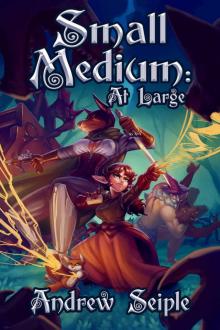 At Large
At Large Bunker Core (Core Control Book 1)
Bunker Core (Core Control Book 1)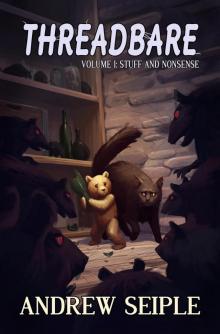 Threadbare Volume 1
Threadbare Volume 1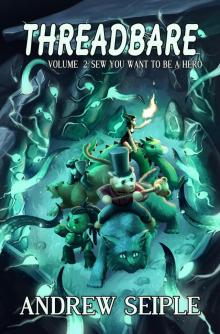 Threadbare Volume 2
Threadbare Volume 2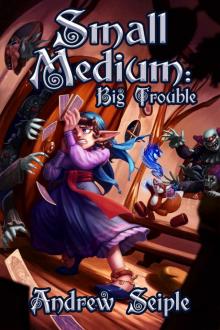 Big Trouble
Big Trouble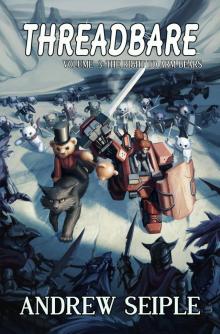 Threadbare Volume 3
Threadbare Volume 3 Dire : Wars (The Dire Saga Book 4)
Dire : Wars (The Dire Saga Book 4) DIRE : TIME (The Dire Saga Book 3)
DIRE : TIME (The Dire Saga Book 3)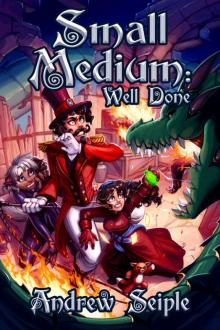 Well Done
Well Done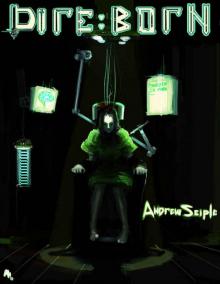 DIRE : BORN
DIRE : BORN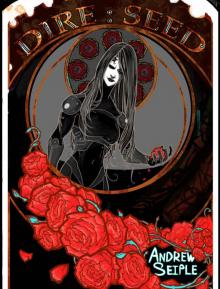 DIRE : SEED (The Dire Saga Book 2)
DIRE : SEED (The Dire Saga Book 2)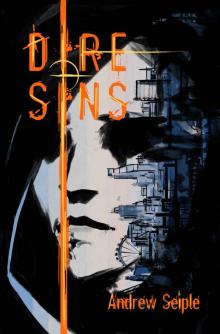 DIRE:SINS (The Dire Saga Book 5)
DIRE:SINS (The Dire Saga Book 5) DIRE : HELL (The Dire Saga Book 6)
DIRE : HELL (The Dire Saga Book 6) The Thin Black Line Between Infernal and Divine
The Thin Black Line Between Infernal and Divine